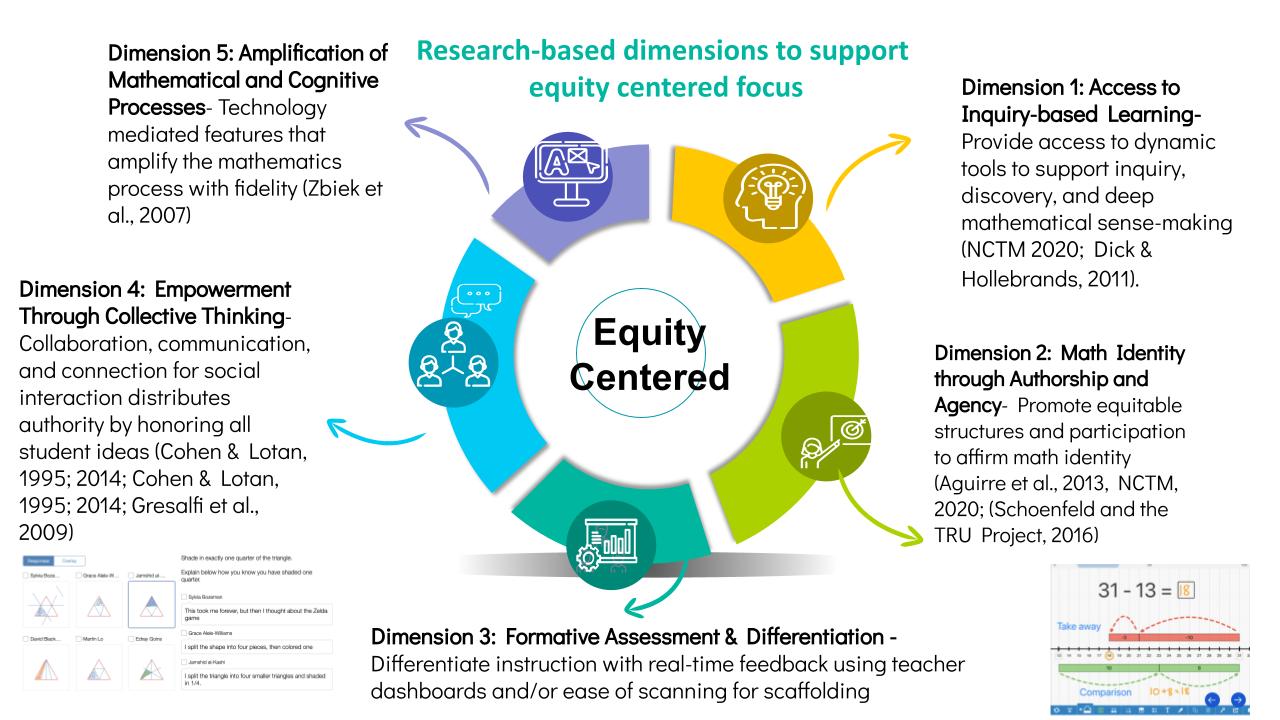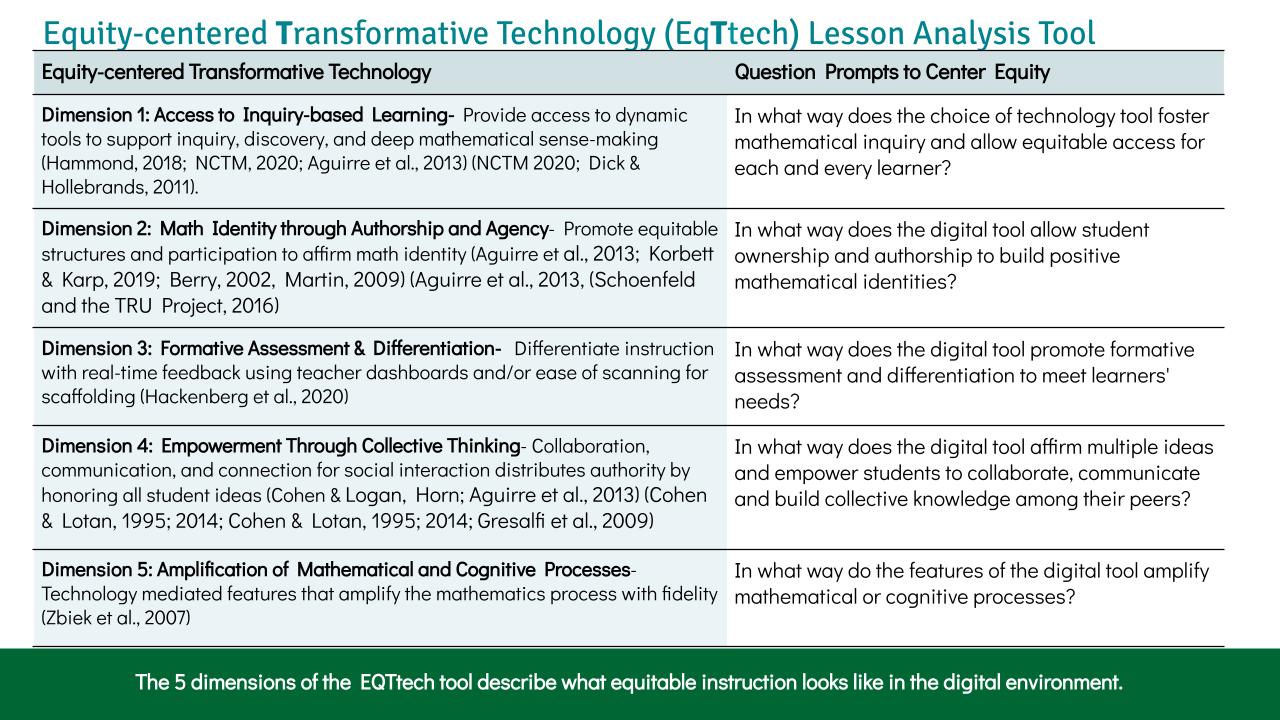Equity-centered Transformative Technology is a set of modules designed to engage elementary teacher candidates (TCs) with deliberate decision-making around lesson development using technological tools, keeping equitable instructional practices at the forefront. Read more about it in our SITE Proceeding Paper (Suh et. al., 2022).
Evolution of Equity-centered Transformative Technology
A decade ago, the first author wrote an article called Tech-knowledgy for Diverse Learners for a Technology Focus Issue in the Mathematics Teaching in the Middle School in Mathematics Education (Suh, 2010a). This article focused on leveraging cognitive tech tools for mathematics teaching and learning. Specifically, the article recommended strategies for teachers to consider the needs of diverse learners and be equipped to support their learning by taking advantage of technology’s affordances. Most importantly, teachers must have “tech-knowledgy”: the knowledge necessary to use cognitive tech tools effectively to construct mathematical knowledge, evaluate the mathematical opportunities presented, and design learning tasks with these tools that amplify the mathematics for their diverse learners. Using case studies, Suh(2010b) described technology-enhanced mathematics lessons in two diverse fifth and sixth grade classrooms at a Title I elementary school near the metropolitan area. The project’s primary goal was to design tasks to both leverage technology and enhance access to critical thinking in mathematics, particularly with data analysis and probability concepts. This paper highlights the opportunities in technology-rich mathematics environments. In addition, the case studies illustrate how to design and implement mathematical tasks using technology to provide opportunities for higher mathematical thinking processes as defined by the Process Standards of the National Council of Teachers of Mathematics (NCTM, 2000): problem solving, connections, representations, communication, reasoning and proof. More recently, our design team has expand the notion of “tech-knowledgy” with a focus on equity (Suh et al., 2021): the knowledge to ensure that the integration of technology amplifies the learning so that the digital tool a) provides access to Inquiry-based learning using math tech b) allows student ownership and authorship to build positive mathematical identities; c) provides formative assessment data and differentiation to meet learners’ needs; d) promotes social interaction to build collective knowledge among their peers; e) amplifies the mathematical or cognitive processes.
Recent Design and Development Cycle in Math Methods CoursesThe integration of technology in the mathematics classroom has always been a key focus for math teacher education (AMTE standards). Recently, there is a call for MTEs to utilize more common language and core practices (McDonald et al., 2013) around ambitious teaching. MTEs have strived to design practice-based assignments to promote ambitious mathematics teaching (Lampert et al., 2013) as well as ambitious teaching integrating technology in mathematics lessons (Suh, 2016). In the past two years, the authors (Dr. Jennifer Suh, Dr. Kimberly Morrow-Leong and and two mathematics coaches, Holly Tate and Kate Roscioli) have been refining this set of modules as a reflective tool to center equity when planning for a tech-enhanced lesson.
\

Project Team:

Jennifer Suh, Ph.D. is a mathematics educator in the School of Education at George Mason University. Dr. Suh teaches mathematics methods courses in the Elementary Education Program and mathematics leadership courses for the Mathematics Specialist Program. She directs the Center for Outreach in Mathematics Professional Learning and Educational Technology, COMPLETE and provides professional development focused on learning trajectory based instruction, equity focused teaching practices and effective integration of technology in the mathematics classrooms. Dr. Suh conducts Lesson Study with teachers to develop high leverage mathematics teaching practices and deepen teachers’ content knowledge using learning trajectories. Currently, her project called EQSTEMM, Advancing Equity and Strengthening Teaching with Elementary Mathematical Modeling, focuses on promoting equitable participation of all students engaging in rigorous mathematics through modeling. She enjoys co-designing authentic community based problem-based modeling tasks with teachers to promote equitable access to 21st century skills in STEM disciplines for diverse student populations.
 Kate Roscioli is a third-year doctoral student pursuing a Ph.D. in Mathematics Education, Teacher Education, and Technology at George Mason University. She is also a Title I Mathematics Specialist in Northern Virginia, working with teachers and students in grades 3 through 5. At George Mason, she serves as a graduate research assistant on an EQSTEMM, an NSF-funded grant with Dr. Jennifer Suh. She earned an M.Ed. in Elementary Education from Marymount University and an M.Ed. in Mathematics Leadership from George Mason University. Her research interests include preparing teachers to integrate technology in mathematics classrooms to promote equitable mathematics practices. Her future goals as a researcher and mathematics teacher educator are to develop frameworks and systems that support pre-service and in-service educators in evaluating technology tools for mathematics instruction.
Kate Roscioli is a third-year doctoral student pursuing a Ph.D. in Mathematics Education, Teacher Education, and Technology at George Mason University. She is also a Title I Mathematics Specialist in Northern Virginia, working with teachers and students in grades 3 through 5. At George Mason, she serves as a graduate research assistant on an EQSTEMM, an NSF-funded grant with Dr. Jennifer Suh. She earned an M.Ed. in Elementary Education from Marymount University and an M.Ed. in Mathematics Leadership from George Mason University. Her research interests include preparing teachers to integrate technology in mathematics classrooms to promote equitable mathematics practices. Her future goals as a researcher and mathematics teacher educator are to develop frameworks and systems that support pre-service and in-service educators in evaluating technology tools for mathematics instruction.
 Kimberly Morrow-Leong, Ph.D is a mathematics education specialist and adjunct instructor at George Mason University. As a doctoral student she served as a professional development coordinator at NCTM and a researcher/coach at AIR. After teaching fifth grade during a year of the pandemic, Kim recently accepted a position as a Senior Content Manager at the Math Learning Center. She is an author of the Mathematize It! series of books for K-8 teachers and is a 2009 recipient of the Presidential Award for Excellence in Mathematics. Kim has served on the NCSM Board as conference program chair and is currently serving on the MathKind Education Advisory Board and the AMTE Advocacy Committee. Dr. Morrow-Leong’s professional interests include transformative evidence-based assessment practices and investigation of the nature of teachers’ engagement with artifacts of student thinking.
Kimberly Morrow-Leong, Ph.D is a mathematics education specialist and adjunct instructor at George Mason University. As a doctoral student she served as a professional development coordinator at NCTM and a researcher/coach at AIR. After teaching fifth grade during a year of the pandemic, Kim recently accepted a position as a Senior Content Manager at the Math Learning Center. She is an author of the Mathematize It! series of books for K-8 teachers and is a 2009 recipient of the Presidential Award for Excellence in Mathematics. Kim has served on the NCSM Board as conference program chair and is currently serving on the MathKind Education Advisory Board and the AMTE Advocacy Committee. Dr. Morrow-Leong’s professional interests include transformative evidence-based assessment practices and investigation of the nature of teachers’ engagement with artifacts of student thinking.
 Holly Tate is a doctoral student at George Mason University working towards her Ph.D. in Mathematics Education Leadership and Research Methodologies. Her research focuses on equity in mathematics education, specifically on the development of critical consciousness through Teaching Mathematics for Social Justice and mathematical modeling. Holly ties her interests of equitable mathematics classrooms into learning alongside teachers as an Instructional Mathematics Coach in a K-5 STEM school in Virginia. Additionally, Holly is in her third semester as a Graduate Research Assistant in partnership with Dr. Jennifer Suh and other universities across the country. Their NSF-funded grant work focuses on mathematical modeling for increased student agency and identity, centering student experience and voice. Prior to her doctoral studies, Holly received her M.I.S. in Mathematics Leadership from Virginia Commonwealth University and her M.Ed. in Elementary Education from James Madison University.
Holly Tate is a doctoral student at George Mason University working towards her Ph.D. in Mathematics Education Leadership and Research Methodologies. Her research focuses on equity in mathematics education, specifically on the development of critical consciousness through Teaching Mathematics for Social Justice and mathematical modeling. Holly ties her interests of equitable mathematics classrooms into learning alongside teachers as an Instructional Mathematics Coach in a K-5 STEM school in Virginia. Additionally, Holly is in her third semester as a Graduate Research Assistant in partnership with Dr. Jennifer Suh and other universities across the country. Their NSF-funded grant work focuses on mathematical modeling for increased student agency and identity, centering student experience and voice. Prior to her doctoral studies, Holly received her M.I.S. in Mathematics Leadership from Virginia Commonwealth University and her M.Ed. in Elementary Education from James Madison University.